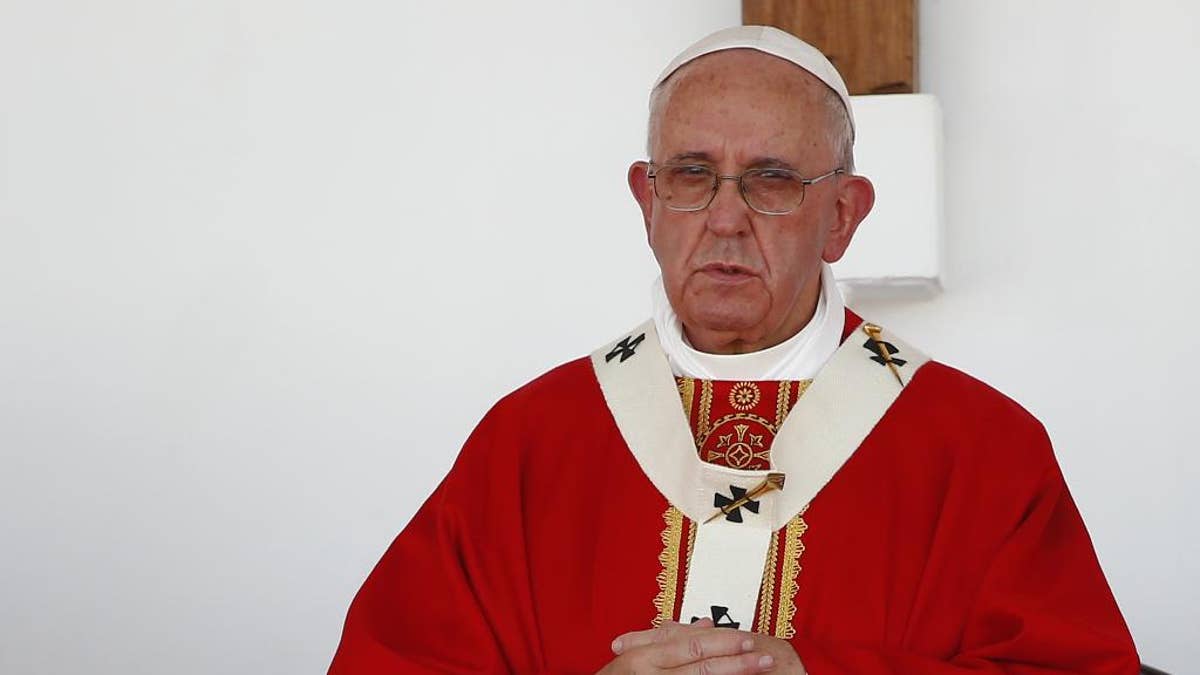
Pope Francis stands on the altar during a Mass in the Plaza of the Revolution, in Holguin, Cuba, Monday, Sept. 21, 2015. Speaking in his homily Francis called on Cubans to heed Jesus Christ's invitation to overcome resistance to change. (Tony Gentile/Pool via AP) (The Associated Press)
Pope Francis’s visit to the United States is attracting a flood of attention, and preparations have been underway for months in the cities and communities that will welcome him. While the pope will be greeted by thousands as he visits our nation’s famous landmarks and cathedrals, he has also planned a stop where the residents cannot come out to greet him: a local jail in Philadelphia.
A jail isn’t a typical location for the fanfare that usually surrounds a papal visit, but Pope Francis’s decision to shine a spotlight on people in jail shouldn’t come as a surprise.
The pope has often implored us through his words and actions to treat the people we put in jail or prison with respect and mercy. Some of those in jail have committed serious crimes, while others have committed relatively minor offenses. Many struggle with mental illness or drug addiction. Many simply can’t afford to make bail. Treating them justly and fairly is a strong Christian, and quintessentially Catholic, imperative. After all, Jesus taught us to visit those in prison. He also told us that what we do for the least of our brothers and sisters we do for Him.
When Pope Francis visits the inmates in Philadelphia we hope that all people, no matter what their traditions or beliefs, will heed his call to treat those who are incarcerated with respect.
Pope Francis continues the tradition of Catholic leaders urging us to offer hope and a second chance to prisoners.
In 2000, the U.S. Conference of Catholic Bishops came together to call for a criminal justice system more closely aligned with faith: “We are convinced that our tradition and our faith offer better alternatives that can hold offenders accountable and challenge them to change their lives; reach out to victims and reject vengeance; restore a sense of community and resist the violence that has engulfed so much of our culture”.
The pope’s visit to the jail in Philadelphia will call attention to a part of our criminal justice system that receives too little notice: local jails. Prisons are the focus of most of the discussion about criminal justice reform, even though 20 times more inmates (12 million) pass through our jails each year compared to our prisons. The jail population is different from prisons because most jail inmates are nonviolent offenders awaiting trial, and innocent in the eyes of the law.
Indeed, many of those in jail don’t belong there. One in six men and one in three women in local jails have serious mental illnesses—rates much higher than in the general public. These people are sick, not always bad. They need treatment, not necessarily incarceration. Others are held in jail for months and even years because they don’t have the money to post a small bond. For example, in New York City, almost a third of inmates in 2012 were held until trial because they could not pay a bond of $500 or less.
We see time and time again that overincarceration tears families apart by locking up fathers, mothers, brothers, and daughters mostly for minor crimes. The vast majority of people in our jails are there for nonviolent offenses like traffic violations or drug use. When they are finally released, most have lost their jobs, which leaves them unable to support their families and puts stress on their loved ones and the community.
Philadelphia has acknowledged these problems, and with support from the MacArthur Foundation they are exploring more effective alternatives to incarceration that will improve public safety, save taxpayer money, and keep more families together.
There is a broad consensus on both left and right that our criminal justice system is failing us, and is in need of transformation.
We are part of Right on Crime, a network of prominent conservatives dedicated to applying conservative principles to improve our justice system. Among the signatories of the Right on Crime Statement of Principles are former Attorney General Ed Meese, Grover Norquist of Americans for Tax Reform, Tony Perkins of the Family Research Council and David Keene, former president of the NRA.
We have worked over the last decade to build conservative support for criminal justice reform, rooted in our political views as well as our faith.
Our Catholic beliefs hold that each person is a child of God and worthy of respect.
A cornerstone of the Catholic faith is that redemption is available to everyone, no matter what they have done. We are all sinners, and the ground is level at the foot of the Cross.
You don’t have to be a Catholic to see the importance of Pope Francis’s message. When he visits the inmates in Philadelphia we hope that all people, no matter what their traditions or beliefs, will heed his call to treat those who are incarcerated with respect, and offer them a second chance to turn their lives around.








































